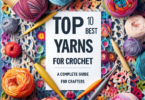Crochet is a captivating craft that allows your creativity to flourish, but every masterpiece begins with picking the right yarn and materials. Whether you’re a seasoned crocheter or just starting, having the right tools in your arsenal can make a world of difference. This ultimate guide will walk you through everything you need to know about crochet yarn and the essential materials that will elevate your crochet game.
Understanding Crochet Yarn
When it comes to crochet, your choice of yarn can determine the overall look and feel of your project. Here are the key factors to consider when selecting yarn.
1. Yarn Weight
Yarn weight refers to the thickness of the yarn, and it significantly impacts the look of your crochet work. Here’s a breakdown of standard yarn weights:
| Yarn Weight | Example Uses |
|---|---|
| Lace | Shawls, doilies |
| Fingering | Lightweight garments |
| Sport | Baby clothes, lightweight accessories |
| Worsted | Sweaters, blankets |
| Bulky | Thick blankets, cozy scarves |
| Super Bulky | Quick projects, rugs |
| Jumbo | Super chunky items, home décor |
2. Fiber Content
The fiber content influences not just the texture but also the durability and how the yarn behaves during crocheting. Here are common types of yarn fibers:
- Acrylic: Affordable, versatile, and easy to care for.
- Wool: Warm and elastic but can be a bit itchy for sensitive skin.
- Cotton: Great for summer clothes and bags, durable but lacks elasticity.
- Bamboo: A blend of softness and strength, often used in lightweight projects.
- Blends: Combining different fibers can yield unique textures and properties.
3. Texture
The texture of your yarn affects how your finished piece feels and looks. Yarn can be:
- Smooth: Ideal for intricate stitches.
- Boucle: Offers a whimsical texture.
- Roving: Has a soft, fluffy feel, perfect for cozy projects.
Essential Crochet Materials
Beyond yarn, there are several essential materials that every crocheter should have on hand:
1. Crochet Hooks
Choosing the right crochet hook is just as important as picking your yarn. They come in various sizes, and typically, the bigger the yarn, the bigger the hook. Here’s a quick reference:
| Yarn Weight | Recommended Hook Size (US) |
|---|---|
| Lace | 0-1.5 |
| Fingering | 1.5-3 |
| Sport | 3-5 |
| Worsted | 6-9 |
| Bulky | 9-11 |
| Super Bulky | 11-15 |
2. Tapestry Needles
These blunt-tipped needles are essential for weaving in ends and sewing pieces together.
3. Stitch Markers
Stitch markers help keep your place in complex patterns. They can be simple plastic markers or decorative versions.
4. Measuring Tape
A measuring tape is crucial for ensuring your project dimensions are accurate.
5. Scissors
A sharp pair of scissors is always necessary for cutting yarn cleanly.
6. Yarn Bowl
A yarn bowl is fantastic for keeping your yarn from tangling while you work.
7. Row Counter
For those intricate patterns, a row counter can be a lifesaver, helping you track your progress easily.
My Favorite Yarn Brands
While there are countless yarn brands out there, a few stand out for quality and variety. Here’s a short list:
- Lion Brand: Offers a wide variety of fibers and colors.
- Red Heart: Known for its budget-friendly yarns.
- Bernat: Perfect for baby projects and blankets.
- Malabrigo: A go-to for luxury yarn with stunning colorways.
FAQs about Crochet Yarn & Materials
Here are some common questions regarding crochet yarn and materials along with their answers:
-
What type of yarn is best for beginners?
- Acrylic yarn is great for beginners because it’s affordable, easy to work with, and widely available.
-
How do I choose the right hook size?
- Refer to the yarn label for recommended hook sizes, but personal preference also plays a role. Experiment!
-
What is the difference between a crochet hook and a knitting needle?
- Crochet hooks are designed to pull loops of yarn through other loops, while knitting needles are used to hold multiple stitches.
-
Can I mix yarn types in a single project?
- Yes, but ensure that they have similar weights and textures for a cohesive look.
-
How do I care for my finished crochet items?
- Follow the care instructions on the yarn label. Most acrylics are machine washable, whereas wool may need hand washing.
-
What if my yarn is twisting while I crochet?
- Use a yarn bowl or a simple dish to hold the yarn and prevent it from tangling.
-
How can I learn new crochet techniques?
- There are many online resources, tutorials, and videos that teach various techniques. Joining a local crochet group can also be helpful.
-
What is the best way to store my yarn?
- Store yarn in a cool, dry place away from direct sunlight. Bins or shelves work best for organization.
-
Is it okay to use a different yarn than what the pattern calls for?
- Yes! Just ensure to consider the yarn weight and fiber content to achieve the desired outcome.
- How do I know how much yarn I need for a project?
- Patterns typically list the required yarn amount, but you can also consult online calculators for estimating yarn needs based on project dimensions.
Conclusion
With the right yarn and essential materials, your crochet projects will surely shine. Understanding the different aspects of yarn, knowing your tools, and finding your preferred brands can make your crochet journey enjoyable and fulfilling. So grab those hooks and start creating! Happy crocheting!


Leave a Comment